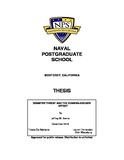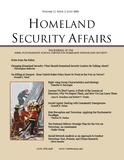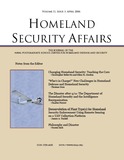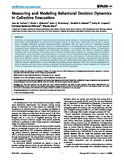Disaster threat and the Dunning-Kruger effect

Download
Author
Siems, Jeffrey W.
Date
2016-12Advisor
Fernandez, Lauren
Woodbury, Glen
Metadata
Show full item recordAbstract
Decision making is a cognitive process of selecting a course of action or belief amongmultiple alternative choices. However, pressures of time, circumstance or unappreciated wickedness can create a situation where an ostensibly illogical choice overtakes rational decision making. Sometimes, when evaluated by those considered experts, decisions made in disasters seem irrational, harmful, or iniquitous in nature. A cognitive bias known as the Dunning-Kruger effect posits that individuals who lack the necessary skills to make rational decisions can also lack the metacognitive ability to realize that their decision making is flawed. The Dunning-Kruger theory theorizes this can result in the individual exhibiting overconfidence to adequately address the threat. Essentially, the unskilled are unaware and overconfident. This thesis investigates the occurrence of the Dunning-Kruger effect in individual decision making during disasters. The author analyzed 12 indicators by coding interview transcripts of disaster survivors. This thesis includes two case studies: Hurricane Katrina, representing a natural disaster, and the World Trade Center attacks, exemplifying a human-caused disaster. In each case, 30 transcripts of survivors were reviewed, and Dunning-Kruger indicators were present in both case studies. How individuals process realized or perceived threat is important for homeland security policy makers. Future research should be conducted to better understand how Dunning-Kruger effects influence disaster decision making.
Rights
Copyright is reserved by the copyright owner.Collections
Related items
Showing items related by title, author, creator and subject.
-
Homeland Security Affairs Journal, Volume II - 2006: Issue 2, July
Naval Postgraduate School Center for Homeland Defense and Security (CHDS) (Monterey, California. Naval Postgraduate SchoolCenter for Homeland Defense and Security, 2006-07);July 2006. The July 2006 issue of Homeland Security Affairs offers articles about risk perception, domestic right wing extremist groups, social network analysis, and the impact of foreign policy on homeland security. It ... -
Homeland Security Affairs Journal, Volume II - 2006: Issue 1, April
Naval Postgraduate School Center for Homeland Defense and Security (CHDS) (Monterey, California. Naval Postgraduate SchoolCenter for Homeland Defense and Security, 2006-04);April 2006. Welcome to the third edition of Homeland Security Affairs. Our Spring 2006 issue features articles about intelligence and homeland security, the demarcations between homeland defense and security, and ideas ... -
Measuring and modeling behavior decision dynamics in collective evacuation
Carlson, Jean M.; Alderson, David L.; Stromberg, Sean P.; Bassett, Danielle S.; Craparo, Emily M.; Guiterrrez-Villarreal, Francisco; Otani, Thomas (PLOS/one, 2014-02-10);Identifying and quantifying factors influencing human decision making remains an outstanding challenge, impacting the performance and predictability of social and technological systems. In many cases, system failures are ...


 16Dec_Siems_Jeffrey.pdf (1.478Mb)
16Dec_Siems_Jeffrey.pdf (1.478Mb)

